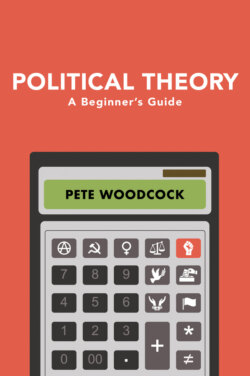Читать книгу Political Theory - Pete Woodcock - Страница 27
KEY QUESTIONS
Оглавление1 Does living a political life involve constant reflection on the nature of justice?
2 Does glory act as a constraint to what a prince may do in Machiavelli’s writings?
3 Is morality derived from the motivations behind an act, or the consequences of them? How might this apply to politics?
4 Can one become a politician and remain morally innocent, or must one get one’s hands dirty?
5 Is passion a good thing in politics?
We all think we know what politics is; but what is the purpose of it? Why do we, as a species, do it, and what is its end? If you went up to the first person you met on the street and asked them what politics is, the likelihood is that they would give the response that it is the stuff that goes on in Washington, DC/Westminster/Canberra/Brussels or similar; and that is a perfectly plausible account of what politics is in the contemporary world, but it doesn’t really help us with what it is for.
In 2012, the city of New York proposed a change to its health codes prohibiting sales of sugary drinks in sizes of more than 16 ounces (around 0.5 of a litre) in the city upon health grounds. One would be able to buy/sell diet or milk-based drinks in any size you liked, but sugary drinks would be limited to 16 ounces due to the calories contained therein, in an attempt to limit citizens’ sugar intake and promote healthy living. There is an inbuilt assumption here that one of the purposes of politics and government is to protect the health of the citizens of a country, and the attempt by the City of New York to limit the sales of large sugary beverages is hardly new in this regard. Around the world cigarettes are taxed (often heavily) to discourage smoking, alcohol is restricted and taxed, many drugs are flat out banned, whilst subsidies might be given to organizations that put on physical activities. One can prohibit certain things that may lead to poor health to actively stop someone gaining access to them, one can tax them to discourage people from buying them, or, in New York’s case, one can restrict the size of sale; of course, one could always buy two or three drinks, but perhaps this is unlikely. Poor diet and lack of exercise lead to poor health in the population, increased strain on medical budgets, and many/most governments see it as their business to combat this. To put it another way, many/most governments see the overall health of the population to be one of the things that politics is for; it is one of the tests of a successful administration that health statistics are on the rise.
Others might argue that this is none of the state’s business, and that policies such as this are instances of the nanny state. This account would argue, perhaps, that politics is for defending rights, protecting property and liberty, and administering the state; what people want to drink, smoke or do in their own time is none of government’s business.
The City of New York’s proposal failed to be implemented, not because it was determined that it was an overreach of the City’s powers, but rather because it would only affect businesses licensed by the City, and many locations inside the city were licensed by the state and were not subject to City regulations on this issue. Equity was at stake here; certain businesses would have been free to sell sugary drinks by the bucket load, whilst others would have restrictions placed upon them, and this would have led to an unequal marketplace. Fairness in the application of principles was deemed a more important goal of politics than health.
